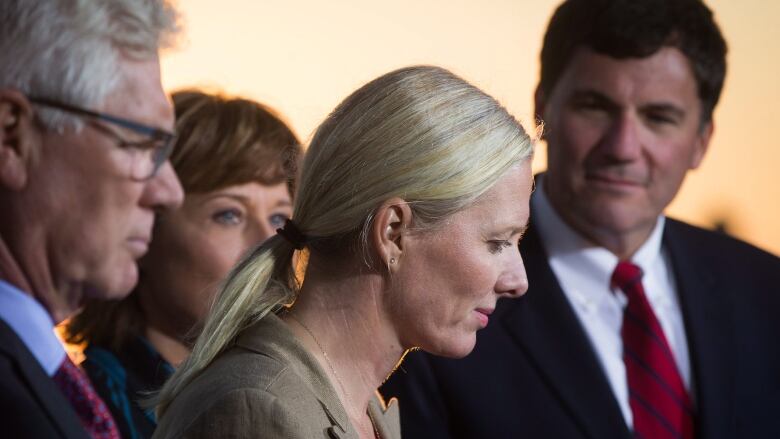Economic benefits of LNG project outweighed 'significant adverse' effects, cabinet decided
Federal cabinet decided environmental harm would be balanced by economic value of project

The federal cabinet knew there would be "significant adverse environmental effects" from the Pacific NorthWest LNG pipeline but approved it anyway, believing economic benefits of the project justified the decision, according to Privy Council documents.
The orders are the written public record of cabinet decisions made behind closed doors.
They show in clear terms what was at stake as the cabinet made its decision.
- Liberals approve LNG project on B.C. coast with 190 conditions
- Analysis: Trudeau government at pains to explain Pacific Northwest LNG
- What the Pacific NorthWest LNG decision could mean for Trans Mountain
On Sept. 27, cabinetgave the green light to the massive $36-billion project that would bring natural gas from northeastern B.C. to a plant in Prince Rupert to be liquefied and then exported to Asia.
As she made the announcement, Federal Environment Minister Catherine McKenna said she believed the project's environmental effects can be balanced off.
"I am confident with the190 legally binding, and scientifically determined conditions that we will address the most important environmental impacts to ensure this project proceeds in the most sustainable manner possible," McKenna said at the time.
But the documents show a more stark choice went on behind the scenes.
"The minister has decided that the project is likely to cause significant adverse environmental effects," said the cabinet order.
But it adds those effects are balanced off by the huge economic benefits the project could bring.
"Whereas the Pacific NorthWest LNG project would contribute to Canada's long-term economic prosperity.
Therefore, his excellency the Governor in Council (Governor General), on the recommendation of the minister of the environment decides that the significant adverse environmental effects that the Pacific NorthWest LNG project is likely to cause are justified in the circumstances."
'Direct tradeoff'
"This is a direct tradeoff," said Smithers, B.C., lawyer Richard Overstall.
He represents the environmental group Skeena Wild, which is concerned about the project's effects on salmon, and the Gitwilgyoots, one of nine Northern Tsimshian tribes and is the tribe that asserts aboriginal title to lands that include the Lelu island and Flora Bank sites of the LNG project.
He thinks the federal government soft-pedalled the downside when it announced the decision.
"That balancing of environment and global warming with present economic prosperity wasn't put out in such stark terms," he said in an interview with CBC News.
"They talked a lot about the process but they didn't actually talk about what the justification was and this is the first time I've actually seen it in writing."
'Hard cap on emissions'
But McKenna said her government made it quite clear there would be effects.
"The significant effects are really on the [greenhouse gas] emissions, which is why it's so important that we have a plan," she said in an interview with CBC Radio's The House.
"We limited the emissions, we put for the first time a hard cap on emissionson this project. But clearly there are significant emissions even though this is going to China ... where natural gas can replace coal," said McKenna.
The maximum cap on emissions from the LNG refinery means direct greenhouse gas emissions from the project will be limited to 4.3 million tonnes ofcarbon dioxide per year, 900,000 tonnes less than what had initially been proposed by the project.
McKenna also pointed out that B.C. has agreed to increase its carbon tax to further offset the increased emissions.
"So when we made this announcement I was with Premier Christy Clark, and she agreed that her carbon price had to go up. She agreed you can't have major projects go ahead that have significant emissions without taking action."
But the decision has left the NDP's environment critic wondering about the Liberal government's promise to do things differently when it comes to approvingto big energy projects.
"They seem to be thinking it's a simplisticprocess," said Linda Duncan."That all they need to do is get together a group of 'experts' and send them out to talk to Indigenous Canadians and maybe some other people who are concerned and then just check that box and then you approve it."
Duncan said people along the route of several major proposed projects are starting to wonder what's going on.
"When are we going to have this promised improved process for reviewing major projects?"
(PDF KB)
(Text KB)CBC is not responsible for 3rd party content












_(720p).jpg)


 OFFICIAL HD MUSIC VIDEO.jpg)
.jpg)



























































































